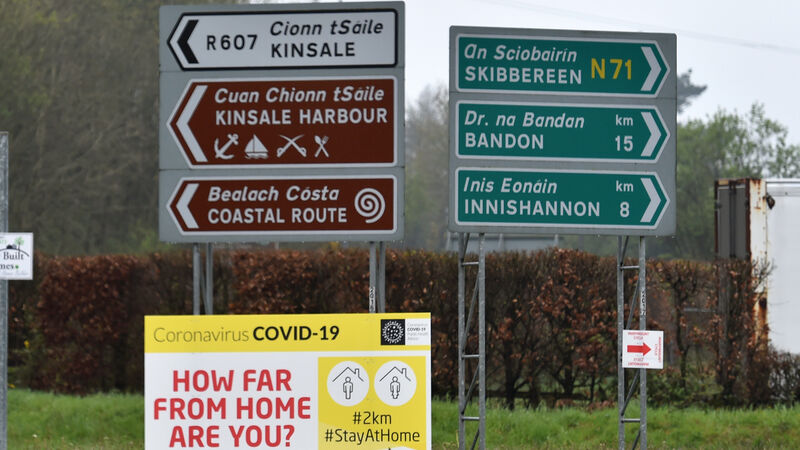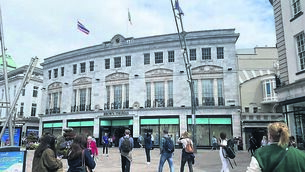Covid inquiry can only reach one conclusion... we locked down too hard for too long

SURREAL TIMES: A Covid-19 sign at Halfway on the N71 main Cork to Bandon road in 2020.
IT was Homer (the poet, not the cartoon guy) who said: “After the event, even a fool is wise.”
We should bear that in mind in the months ahead, when the official inquiry into Ireland’s handling of the Covid pandemic begins to sift through the data and evidence and reach its conclusions and recommendations.
The consensus is that, although mistakes were certainly made by politicians, particularly in allowing the virus into nursing homes, they acted to the best of their ability, and in what they thought was the public’s interest.
We don’t need a witch-hunt - there is no call for one, unlike, say, in the UK. Our pandemic inquiry needs to seek out the light, and avoid the heat.
Essentially, the role of the Covid inquiry will be to come up with terms of reference for the next time a pandemic threatens our shores, and to do so while those strange and for some traumatic years are fresh in our memories, and before false narratives take hold.
That is why it was heartening to hear Taoiseach Leo Varadkar say, as he announced the inquiry last month, that, although mistakes were made, the key role of the inquiry is to assess “how we can better prepare for a future pandemic, should one occur”.
One of the difficulties for the committee who take up the cudgels will be to avoid being wise after the event. They will need to transport their minds back to those early months of 2020, and recall the fear and trepidation, the sense of entering the unknown, and the great desire to protect our most vulnerable.
The actions of our politicians and health authorities throughout 2020 and 2021 can only be judged on the data and grasp of public mood they experienced then, not on what we know now with 20-20 vision. Their over-riding policy was caution.
All that said, it is now my firm belief that one of the clearest conclusions we can make from the pandemic, is that Ireland was over-cautious: We locked down too hard, and for too long, to the detriment of the majority of our population.
It is my sincere hope that the inquiry will reflect this.
Yes, the lockdowns in Ireland - among the most severe and long-lasting in the world - saved lives in the short-term, but arguably they will lead to more deaths in the middle- and long-term, and they caused great and, as yet, mostly untold hardship and misery to large swathes of the population.
We are only now hearing some of the desperately awful stories of those Covid times.
Such as the Cork woman last month who lamented the fact her mother died alone in a Cork hospital, who was so frightened, she made a 999 call to gardaí.
Such as the teenage girl I spoke to recently, who told me the closure of schools and cutting off of social ties made it a really difficult time for her - two years and more when she should have been having fun with friends.
Such as the artist we recently interviewed for the Echo, who told us the effect lockdowns had on him in West Cork: “By September, 2020, we were really starting to feel isolated,” he said. “The mental health challenges my children and wife were experiencing were palpable. It was hard to get out of bed. It was very hard for all of us.”
These individual stories are far from outliers, and are just the tip of an emerging iceberg that will take years - decades, even - to fully show itself.
We recently learned that more than 4,000 cancers may have been missed during the pandemic, because people put off seeking medical advice, and because of disruption to health services.
We often hear people say they had a “good pandemic”, but they were the lucky ones. Most of us view it now as a surreal time.
Sure, some shy, introverted people may have welcomed lockdowns with open arms, but, in any case, how damaging is it in the long-term for such people to be locked away from society?
Psychologists will have an important role to play in the Covid inquiry, which will also have to analyse deaths from the virus, and will almost certainly have to review them down.
That insensitive phrase, did someone die from Covid or with Covid, will need to be reenacted, in order to give us accurate statistics on which to base conclusions.
It’s important, because the next time a pandemic threatens these shores, with a similar fatality rate to Covid-19, our politicians can dust down the inquiry report and act upon it. Next time, they may give the public more leeway to travel and socialise, especially those who are least vulnerable.
At the same time, it’s important the inquiry doesn’t turn into an exercise in judgmental finger-pointing, a forum for hot-takes, and a place for scapegoats to be sacrificed.
Of course, by its nature, there will be emotional testimony - from people who lost loves ones, and from those who suffered in the lockdowns - but the committee has to think practically.
Before Covid, the annual flu season would claim hundreds of Irish lives every winter, and we never thought of locking down then. How serious does a new virus have to be to subject society to such restrictions on freedom?
If the strict lockdowns saved several thousand lives from Covid, but end up causing several thousand deaths through missed cancer diagnoses and other health problems, then that must be reflected in the report.
When you add in the misery caused by lockdowns to so many people - from children missing out on education, to young men and women missing out on their social lives, to people worried about their jobs, not to mention the lost family occasions, and the indignity many people suffered in their final days - it leads me to believe our lockdowns were too harsh.
I stress, we cannot blame our politicians for this reality. They acted in our interests - but it turns out, with the benefit of hindsight, that they were wrong.
I was wrong too. I vividly recall being in favour of the initial lockdowns, and being fearful for older members of my family.
However, by March, 2021, I was sensing Ireland was out of step with its people and with much of the rest of the world, and I urged Taoiseach Micheál Martin to lift lockdowns in counties like Cork, where daily numbers with the virus were down to single figures.
There is something else the Covid inquiry must address.
A key driver of the strict lockdowns was the fear our health system wouldn’t cope, and the overload would be catastrophic. It was a fear greatly stoked by the scenes in Italy of people dying in corridors, with intensive care departments brimming over.
The pandemic inquiry needs to stipulate that Ireland must have an emergency system in place, which is constantly monitored and updated, to ensure such a fear does not drive us again.










 App?
App?




